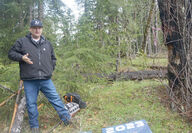Sorted by date Results 26 - 37 of 37

Jesse Jackson stands proudly, flute in hand, on several hundred acres of forest near Roseburg that the Cow Creek Band of Umpqua Tribe of Indians fought to get back from the federal government in 2016 after more than 160 years of private and federal management and decades of heavy logging. Jackson, the education programs manager for the tribe, offers gratitude to the land through his music and the indigenous Takelma language once spoken widely by the tribe. He describes huckleberries,...

Oregon’s getting better at preventing and responding to wildfires, experts said Thursday, but much more still needs to be done. A panel of University of Oregon professors who study climate change, smoke, and wildfire discussed the 2024 wildfire season in an online forum with journalists as the West braces for summer fires. Wildfire risk in the West and Oregon this year is not abnormally higher than in recent years, said Daniel Gavin, a professor in the geography department who specializes in pal...

Nancy Matela co-owns a vacation home in a wildfire zone northwest of Bend that has a new, annual property insurance premium of $9,000. It’s more than nine times what the company Safeco charged her a year ago. That policy remains her only option as well: Her broker couldn’t find her another one. Matela is among a growing number of homeowners in central, southern, and eastern Oregon who have faced higher annual premiums or had their policies canceled when they came up for renewal, with some ins...

For much of the last century, fish hatcheries have been built in the Northwest, across the U.S., and around the world to boost fish populations where wild numbers have gone down. But an analysis of more than 200 studies on hatchery programs meant to boost salmonid numbers across the globe – including salmon, trout, and whitefish – shows that nearly all have had negative impacts on the wild populations of those fish. Most commonly, hatchery fish reduce the genetic diversity of wild fish, lea...

To avoid major lawsuits under the federal Endangered Species Act, state and federal agencies have crafted a plan to reduce the amount of timber logged from Oregon’s western state-owned forests annually by up to 40%. Officials in some counties that have relied on those timber revenues for the past 80 years are angry and worried about the impact that could have on their budgets and social services. Last week, the Oregon Department of Forestry released its long-awaited projections showing how m...

The Oregon Water Resources Department must update its 68-year-old rules for permitting new wells or double down on regulating existing ones, department officials said. If it doesn’t, the growing problem of the state’s depleted groundwater reserves “is going to get very expensive,” said department director Doug Woodcock. Many of Oregon’s 20 groundwater basins are being sucked dry faster than water can naturally be replaced, according to the agency. This is an issue across the West, where dro...

Thousands of kids across Oregon are guaranteed summer and after-school programs in the coming school year with millions in new federal funding. The Oregon Department of Education and the U.S. Department of Education announced Monday that 25 school and education service districts around the state, along with the Boys & Girls Club and United Way, will share more than $53.5 million during the next five years to provide summer and after-school programs. The money is from the federal 21st Century...

Oregon’s attorney general plans to join nine attorneys general in suing the federal Environmental Protection Agency for failing to ensure newly manufactured wood-burning stoves and fireplaces don’t contaminate the air and harm public health. Ellen Rosenblum and the attorneys general from Alaska, Illinois, Maryland, Massachusetts, Minnesota, New Jersey, New York, Vermont, and Washington notified the agency on June 29 of their intent to sue, giving it 60 days' notice to take action or neg...

A $120 million initiative to boost literacy would be one of the single largest investments of its type in Oregon history if it passes. But during a public hearing for the proposal at the House Committee on Education on Monday, critics said it doesn’t go far enough and risks wasting money without stricter spending rules. At the end of the hearing, the committee unanimously approved the initiative, moving it to the budget-writing Joint Ways & Means Committee. It would be the seventh major initiati...

More than 40% of Oregon adults say the state’s forests are over logged, but most also believe that harvesting timber is part of maintaining healthy forests, according to a recent survey. In November, the nonprofit, nonpartisan group Oregon Values and Beliefs Center sent an online survey to residents statewide to learn about their attitudes toward logging and the health of state forests. More than 1,550 people responded. They were asked about their “gut feelings” toward logging in Oregon, and whe...

Lisa Charpilloz-Hanson learns best out in the field, which is how the new director of the Oregon Watershed Enhancement Board found herself, first month on the job, standing over a bridge in Tillamook watching salmon and steelhead swim upstream. In her new role, Charpilloz-Hanson now has a hand in how to spend $170 million each year for projects that improve fish and wildlife habitat across Oregon’s waterways. The money, issued in grants, comes from state lottery profits, the sale of salmon l...

It's been six years since the Chemawa Indian School in Salem was last reviewed by the federal Department of the Interior, which found then that "the school did not have an adequate plan in place to ensure students' educational achievement." Now U.S. Sens. Jeff Merkley and Ron Wyden have asked the department to look into what progress has been made in the six years since, and to demand greater transparency of the school's finances. Chemawa opened in 1880 as a residential boarding school, founded...